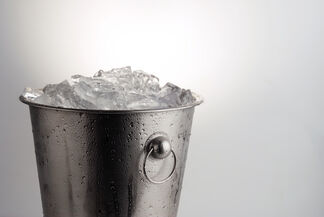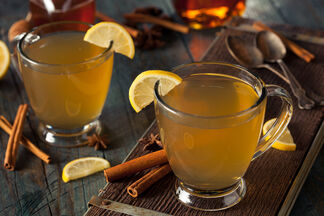
Is Whisky Healthy???
Not a medical opinion, but a collection of facts and studies
Grace Jones – known to her friends as Amazing Grace - became Britain’s oldest living person at 112 years old - and said the secret to long life is drinking a tot of whisky every day for over 60 years. Her whisky of choice, by the way, was the Famous Grouse blend.
On her 110th Birthday, she told reporters “I started having a nightly tot of it when I turned 50 so I’ve been having it every night for the last 60 years and I certainly have no intention of stopping now. My doctor said ‘keep up with the whisky Grace, it’s good for your heart’ ".
When my own mother-in-law was a young girl, growing up in Aberdeen in Scotland, the winters would be cold and raw. Her mother would give her a spoonful of whisky on her morning porridge to help keep the cold out. True story!
In the alcoholic drinks line-up, red wine is often considered to be the most “healthy” drink. But throughout the years, whisky has been used – and proven – to be a contributor to good health. Of course, only if drunk in “reasonable” amounts. I am not a doctor or a scientist, so please do not just take my word for it, but here are some arguments that whisky is more good for you than not - as long as you drink responsibly….

Some Scientific Research:
A scientific study in Italy
We all know the stories about peanuts on bars, right? Well there was a study that was published in November 2017 in Italy involving ice buckets kept on bars. 60 samples of ice were taken from bars and analysed and shown that on average, the ice in the ice bucket in a bar contains 31 types of bacteria including some pretty nasty ones. Ones that could make you pretty ill.
A further experiment tried adding various spirits and soft drinks with the ice to see if any bacteria survived. These included vodka, whisky, Martini, peach tea, tonic water and coke. Only whisky killed all 31 varieties of bacteria. Now that’s a result for whisky! Although as mentioned in my last Blog entry, I do not advocate drinking whisky with ice and this is yet another reason to avoid ice!
A slew of additional scientific research has found that whisky has some fascinating properties. Take the high concentration of ellagic acid. Those are the antioxidants that help your body destroy rogue cells. In other words, it helps fight a ton of different diseases. It's the same thing that's in wine, but whisky has tons more of these little warriors.

Historic Views and Evidence
What was the opinion a few hundred years ago?
Historian Raphael Hollinshed wrote about the healthy properties of whisky in his 1577 book Chronicles of England, Scotland and Ireland.
"Being moderately taken, it slows the age, cuts phlegm, helps digestion, cures the dropsy, it heals the strangulation, keeps and preserves the head from whirling, the tongue from lisping, the stomach from womblying, the guts from rumbling, the hands from shivering, the bones from aching…and truly it is a sovereign liquor if it be orderly taken."
I have no idea what several of these things are, but I am happy my whisky hobby has kept them at bay! You can still buy his book by the way!
It should also be added that during Hollinshed's time, whisky was also used as an antiseptic on battlefields, especially because effective medicine was hard to come by in those days. The connection with medicine may even have led to the common usage of the word 'dram' to describe a measure of whisky, a term originally used for an apothecaries’ weight.
The word whisky itself is thought to be derived from “uisga beatha” (Gaelic for "Water of Life").

American Prohibition
They banned alcohol - except for medicinal purposes
During Prohibition, the U.S. Treasury Department authorized physicians to write prescriptions for medicinal alcohol. Licensed doctors, with pads of government-issued prescription forms, like the one shown here, advised their patients to take regular doses of hooch to stave off a number of ailments—cancer, indigestion and depression among them.
This privilege was one of the few legal exceptions to the 13-year ban on the production, sale and distribution of alcohol, initiated in 1920 by the 18th Amendment. “A person may, without a permit, purchase and use liquor for medicinal purposes when prescribed by a physician as herein provided.” - Volstead Act [1920]. The National Prohibition Act, which enforced the ban, also allowed farmers to produce wine for their own consumption and priests, ministers and rabbis to serve it during religious ceremonies.
This was a real opportunity for some pharmacy businesses. Walgreens (one of the largest pharmaceutical outlets in the US) grew from 20 to 525 stores between 1920 and 1933!
Whisky Fights Cancer!
Or at least may help keep it at bay
Whisky has as many anti-oxidants as wine. It contains more ellagic acid (the same antioxidant found in wine) than wine, which helps absorb rogue cells in the body, according to Jim Swan, the celebrated whisky industry consultant dubbed the "Einstein of whisky." (there will be a future Blog entry just about this fine fellow) at a medical conference in 2005.
However, it should be noted that the same acid is easily found in fruit. But where would you prefer to get your ellagic acid? The more sources the better, I say!
Whisky Lowers The Risk of Dementia and Heart Disease
A couple of studies
A study from 2003 published by the National Institute of Health says that adults who consumed one to six portions a week were half as likely to suffer dementia as non-drinkers and heavy drinkers. A 2011 German study came to a similar conclusion. This applied to alcohol generally as opposed to whisky specifically, though.
I should also add that in 2015, Britain's National Health Service released new guidelines recommending alcohol be completely excised from your diet to decrease dementia risk.
Also note that consuming too much whisky in an evening can result in short-term memory loss, but this should not be confused with dementia!
Separate studies in the European Journal of Clinical Nutrition, Harvard University, and the European Heart Journal all come to the same conclusion: A moderate amount of alcohol - maximum seven small glasses of whisky a week - will reduce to some degree the risk of heart disease and heart failure. The European Journal study especially, led by the Rowett Research Institute in Aberdeen, is the most relevant and interesting. They measured antioxidant levels in a group of nine men after they drank wine, aged single malt, and "new spirit" (alcohol just out of the still). They found that the single malt provided the largest concentrations of antioxidants.
Whisky's blood-thinning properties also means a dram or two can help to lower the chance of blood clots and by extension, strokes.
Whisky Has No Fat, No Carbs, and Almost No Sugar
A great drink if you are on a diet! (or even if you are not)
Whisky contains absolutely no fat, and barely any carbohydrates or sugar. That makes it a better choice for diabetics than most other alcohol, as it will barely change the levels of blood glucose. The previously mentioned Harvard study also finds that alcohol in moderate quantities might even protect against type-2 diabetes. Whisky is also gluten-free, due to the distillation process. When you sample a really sweet whisky, most of the sweetness comes from other oils and compounds in the whisky, not sugar.

Whisky Helps Fight Off Cold Symptoms
But don't use your best single malt for this!
It’s been known in Scotland for a long time, as proven by my mother-in-law and her mother, that whisky does help fight colds. I am sure that everyone here knows that hot toddies can work wonders for you when you have a cold (add spices for flavouring, if you like). But there is also a science behind it.
According to Dr. William Schaffner, Chairman of Preventative Medicine at Vanderbilt University, is that the alcohol dilates blood vessels, making it easier for mucus membranes to deal with the infection.
If you fancy trying a “hot toddy” to get you over your cold, add almost boiling water to a tot of whisky. Add honey and lemon juice and drink it as hot as you can. It always works for me but I do advise that you do not use your best whisky for this! An inexpensive blend will do the job.